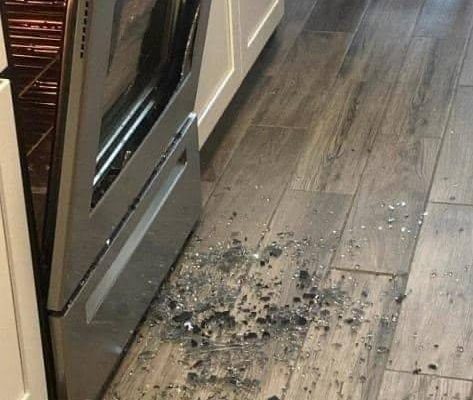The Surprising Cases of Exploding Oven Doors
During the COVID-19 lockdown, Cheryl, a suburban mom, faced a comparable situation. She tried baking brownies, but they were undercooked, leading her to discover that her three-month-old oven’s temperature was off by about 25 degrees. Post-quarantine, she planned to have the appliance repaired. However, before scheduling a technician, she ran a self-cleaning cycle. Near the end of the cycle, a loud explosion shattered the oven’s inner glass door.
Similarly, Michelle Wheat encountered a frightening moment when her oven door shattered, even though the appliance wasn’t being used. Glass fragments spread across her kitchen, but fortunately, her four young children were unharmed. Like Cheryl’s Bosch oven, Wheat’s appliance, made by Frigidaire, was among several brands reported for such incidents. The Consumer Product Safety Commission has recorded about 450 cases of glass oven doors shattering since 2019.
Challenges With Manufacturers
Unfortunately, homeowners like Truesdale, Cheryl, and Wheat have faced challenges in dealing with manufacturers after these incidents. While Truesdale’s oven was under warranty, the technician sent by Frigidaire blamed her family for the explosion, despite the oven being off. This left her to pay out of pocket for a replacement door. Cheryl, on the other hand, had her oven replaced by Bosch after NBC intervened on her behalf.
Wheat’s case was more complicated. Her oven was no longer under warranty, forcing her to pay $100 for a technician visit and $314 for a replacement door. Frigidaire suggested she purchase an extended warranty to avoid such costs in the future. Frustrated, Wheat remarked, “This shouldn’t have happened in the first place, and that’s the point I was trying to make.”
Why Do Oven Doors Shatter?
Mark Meshulam, a glass expert and founder of Chicago Window Expert, explains that two types of glass are commonly used in oven doors, each with unique properties:
- Soda Lime Glass: This type of tempered glass is made by rapidly heating and cooling standard window glass to increase its strength. However, it is less resistant to the extreme temperature changes ovens undergo, making it more prone to shattering.
- Borosilicate Glass: Often used in laboratory equipment and older Pyrex cookware, borosilicate glass tolerates heat fluctuations much better but is less commonly used in modern ovens.
Meshulam also notes that a phenomenon called nickel sulfide inclusion could be responsible for some of these incidents. This defect involves a tiny particle, about a tenth of a millimeter in diameter, embedded in the glass. Over time, the particle can cause internal stress, and a high-heat event like a self-cleaning cycle can trigger the glass to shatter unexpectedly.
While Meshulam assures that the self-cleaning feature of ovens is generally safe, he acknowledges that minor chips or imperfections in the glass could cause a delayed shattering effect, even when the oven isn’t in use.
Tips for Preventing Shattered Oven Doors
Although some causes of damage occur during manufacturing, shipping, or installation and are beyond a homeowner’s control, certain precautions can help reduce the risk of shattered oven doors:
- Gentle Cleaning: Avoid using abrasive materials like scouring pads that can create tiny scratches. Opt for soft sponges or brushes instead.
- Handle with Care: Don’t slam or kick the oven door shut, as even small impacts can weaken the glass over time.
- Avoid Overloading the Door: Don’t place heavy dishes on the oven door while removing food, as the weight could strain the glass.
- Check Placement: Ensure that oven racks and trays are correctly positioned, and avoid using the door to push them into place.
- Monitor Temperature Exposure: Prevent sudden temperature changes, such as hanging wet towels on the oven handle.
- Mind Contact: Make sure dishes inside the oven don’t press against the glass door during use.
Final Thoughts
The phenomenon of shattering oven doors is both alarming and inconvenient, leaving homeowners questioning the reliability of their appliances. Understanding the causes of these incidents—from thermal stress to manufacturing defects—can help mitigate the risks. While such occurrences are rare, following simple preventative measures like gentle cleaning, proper handling, and avoiding excessive weight on the oven door can significantly reduce the likelihood of glass breakage.
If your oven door does shatter, document the incident and report it to the manufacturer. Although frustrating, being proactive and informed can help protect your home and loved ones. For now, adopting these precautions ensures that your kitchen remains a safe and functional space, free from unexpected and costly surprises.
